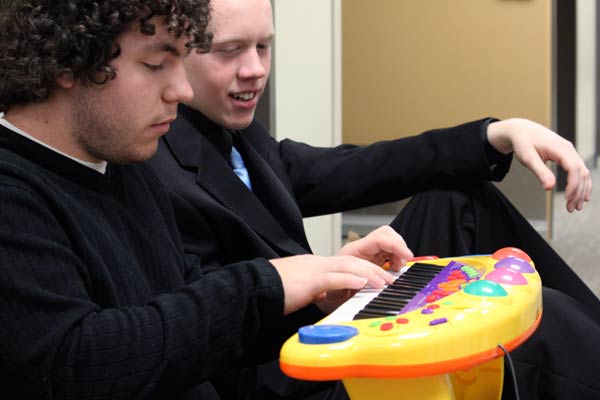The flat-screen rock ‘n’ roll revival
January 12, 2010 by Jacob Zinn · Leave a Comment

Alto sax student Laurence Cain, 18, watches guitar student Kyle Poehlke, 21, plays "A Thousand Miles" by Vanessa Carlton on a vintage Fisher Price toy piano. (Jacob Zinn photo)
Parents who remember hearing bands such as the Rolling Stones for the first time when they were kids are now showing their kids these artists for that same experience.
“[My dad] sits in his room, rockin’ out to all that stuff,” said Blake Gervais, 18, a first-year saxophonist in Kwantlen’s music program. “You’re exposed to it ’cause your parents listen to it.”
Gillian White, 18, also a first year saxophonist, added that her parents have control of the radio in the car. “Most of the time, it’s better than the new stuff. They don’t have to fix their voices or anything when they record.”
According to Nielsen SoundScan’s 2008 top-10 list, AC/DC was the second-best selling artist in the United States that year with 3.42 million albums sold. Of those albums, 1.92 million were the band’s 2008 release, Black Ice.
AC/DC, whose members are now aged 54 to 62, released their first album in 1975.
In 2007, the Eagles were the third-best selling artist with 3.6 million albums sold, of which 2.6 million were their 2007 album, Long Road out of Eden, the band’s first album since 1979.
The Eagles, whose members are aged 61 to 62, released their first album in 1972.
In both 2007 and 2008, the rest of the musicians on those top-10 lists were modern artists with high rotation on radio.
Joey Moore, a sociology professor at Vancouver Island University, explained why older music appeals to younger people.
Moore said that some parents force their children to listen to the groups they grew up with, and some teens like the music their parents listened to.
“It’s music their parents pissed off their parents with and they can do the same thing by playing it really loud,” said Moore.
Rebellion through music is associated with youth, and has been for many generations, but Kwantlen guitar teacher Don Hlus said that’s less true today.
“Parents for the most part want to nurture an interest in music, especially in music that the parents understand,” Hlus said. “There’s always these generational gaps and the fact that those are being bridged I think is quite appealing.”
The use of music in video games such as Rock Band and Guitar Hero has also introduced new audiences to older music.
Natascia Dell’erba, 18, a first-year vocalist, said she is surprised to hear her eight-year-old sister singing the Doors and Jimi Hendrix songs featured in these video games.
By releasing games on consoles offered by Microsoft, Sony and Nintendo, game design companies aim to reach a larger market of gamers than if the games were released on one console.
“You have every single side of the video-game world covered,” said Jessica McLaughlin, 18, a first-year saxophonist.
Sales of the 1974 single “Same Old Song and Dance” by Aerosmith increased 400 per cent with the release of Guitar Hero III: Legends of Rock in the 2007 Christmas season, according to an MSNBC article.
“Many artists are very shrewd businessmen,” said Hlus. “They’re going, ‘Hey, this is a generation that doesn’t know our music,’ and they feel there is a universal appeal that’s kind of timeless.’
This music has become a common interest not only between youth and parents, but among youth in different social circles. Moore said that despite differing musical tastes, teens in all cliques tend to enjoy ’60s and ’70s bands.
With the re-emergence of older bands in video games, biographic films and reunion tours, today’s musicians don’t put as much effort into their music.
“[There used to be] more of a focus on the musical ability of the artists rather than how good you look on stage and how much money you can throw at a recording studio,” said Gervais.
Music students interviewed also said that cover versions of old songs can’t match up to the original recordings they were based on.


